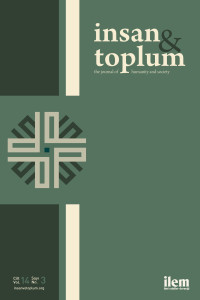Öz
Bu mektup, ChatGPT gibi üretken yapay zeka (GAI) teknolojilerinin akademik yazım ve araştırma üzerindeki derin etkisini tartışmaktadır. GAI araçları, metin oluşturma, dilbilgisi geliştirme ve literatür tarama gibi yetenekler sunarak içerik oluşturmada devrim yaratmıştır. Ancak mektupta, özellikle GAI'nin akran değerlendirme sürecinde kullanımı ve intihal ve önyargı yaratma potansiyeli ile ilgili etik kaygılar dile getirilmektedir. GAI üretkenliği artırabilirken, içerik için sorumluluk üstlenememesi nedeniyle ortak yazar olarak kabul edilemeyeceği vurgulanmaktadır. Mektup, araştırma ve yayıncılıkta dürüstlük ve etik standartları korumak için insan gözetiminin temel rolünü korurken, GAI'nin akademik çalışmalardaki katkılarının açıkça kabul edilmesi çağrısında bulunuyor.
Kaynakça
- Polonsky, M.J., & Rotman, J.D. (2023). Should artificial intelligent agents be your co-author? Arguments in favour, informed by ChatGPT. Australasian Marketing Journal, 31(2), 91–96. https://doi. org/10.1177/14413582231167882
- Septiandri, A. A., Constantinidies, M., & Quercia, D. (2023). The impact of AI innovations on US occupations. Nokia Bell Labs, UK.
- Stokel-Walker, C. (2023). ChatGPT listed as author on research papers: Many scientists disapprove. Nature, 613(7945), 620–621. https://doi.org/10.1038/d41586-023-00107-z
- Stokel-Walker C. (2022). AI bot ChatGPT writes smart essays-should professors worry? Nature, https://doi.org/10.1038/d41586-022-04397-7
- Tam, W., Huynh, T., Tang, A., Luong, S., Khatri, Y., & Zhou, W. (2023). Nursing education in the age of artificial intelligence powered Chatbots (AI-Chatbots): Are we ready yet? Nurse Education Today, 129. https://doi.org/10.1016/j.nedt.2023.105917
Öz
This paper discusses the profound impact of generative AI (GAI) technologies, like ChatGPT, on academic writing and research. GAI tools have revolutionized content creation, offering capabilities such as text generation, grammar improvement, and literature scanning. However, the letter raises ethical concerns, particularly regarding the use of GAI in the peer review process and its potential to introduce plagiarism and bias. It emphasizes that while GAI can enhance productivity, it cannot be considered a co-author due to its inability to assume responsibility for the content. The letter calls for clear acknowledgment of GAI's contributions in academic work while upholding the essential role of human oversight to maintain integrity and ethical standards in research and publishing.
Anahtar Kelimeler
Kaynakça
- Polonsky, M.J., & Rotman, J.D. (2023). Should artificial intelligent agents be your co-author? Arguments in favour, informed by ChatGPT. Australasian Marketing Journal, 31(2), 91–96. https://doi. org/10.1177/14413582231167882
- Septiandri, A. A., Constantinidies, M., & Quercia, D. (2023). The impact of AI innovations on US occupations. Nokia Bell Labs, UK.
- Stokel-Walker, C. (2023). ChatGPT listed as author on research papers: Many scientists disapprove. Nature, 613(7945), 620–621. https://doi.org/10.1038/d41586-023-00107-z
- Stokel-Walker C. (2022). AI bot ChatGPT writes smart essays-should professors worry? Nature, https://doi.org/10.1038/d41586-022-04397-7
- Tam, W., Huynh, T., Tang, A., Luong, S., Khatri, Y., & Zhou, W. (2023). Nursing education in the age of artificial intelligence powered Chatbots (AI-Chatbots): Are we ready yet? Nurse Education Today, 129. https://doi.org/10.1016/j.nedt.2023.105917
Ayrıntılar
| Birincil Dil | İngilizce |
|---|---|
| Konular | Bilim ve Teknoloji Sosyolojisi ve Sosyal Bilimler |
| Bölüm | Editöre Mektup |
| Yazarlar | |
| Yayımlanma Tarihi | 4 Eylül 2024 |
| Gönderilme Tarihi | 16 Temmuz 2024 |
| Kabul Tarihi | 25 Ağustos 2024 |
| Yayımlandığı Sayı | Yıl 2024 Cilt: 14 Sayı: 3 |


